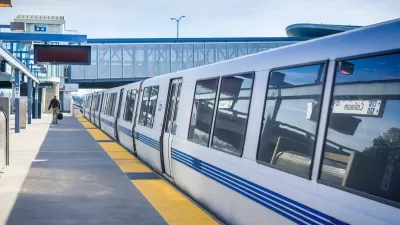Under new state regulations, Colorado transportation projects will be required to reduce GHG emissions and promote more sustainable transportation modes.

New rules from the Colorado Transportation Commission will shift the state's focus from road construction to more sustainable modes of transit in an effort to reduce greenhouse gas emissions. An article by Noelle Phillips and Jon Murray outlines the new regulations, which transportation commissioner Kathleen Bracke called a "critically important milestone." Starting February 14, future projects will be required to assess the impact of new projects on emissions and switch to cleaner alternatives if the projections surpass a set limit. "The Department of Transportation’s commissioners hope the new rules build on the state’s push to put more electric vehicles on the road while improving mass transit, biking and walking options."
The rules received pushback from critics who worry that rural, car-dependent areas could suffer disproportionately from reduced transportation funding. Business groups and some local leaders in Colorado's burgeoning Northern Front Range region claim that the rapid growth of their communities indicates a need for roadway expansions, arguing that the Commission is overstepping its legal authority.
Meanwhile, environmental groups say the regulations don't go far enough to make the drastic reductions in emissions needed to mitigate the effects of climate change and air pollution. While the state has pledged to get one million electric vehicles on its roads by 2030, environmentalists say the benefits won't accrue fast enough.

Planetizen Federal Action Tracker
A weekly monitor of how Trump’s orders and actions are impacting planners and planning in America.

Maui's Vacation Rental Debate Turns Ugly
Verbal attacks, misinformation campaigns and fistfights plague a high-stakes debate to convert thousands of vacation rentals into long-term housing.

San Francisco Suspends Traffic Calming Amidst Record Deaths
Citing “a challenging fiscal landscape,” the city will cease the program on the heels of 42 traffic deaths, including 24 pedestrians.

Amtrak Rolls Out New Orleans to Alabama “Mardi Gras” Train
The new service will operate morning and evening departures between Mobile and New Orleans.

The Subversive Car-Free Guide to Trump's Great American Road Trip
Car-free ways to access Chicagoland’s best tourist attractions.

San Antonio and Austin are Fusing Into one Massive Megaregion
The region spanning the two central Texas cities is growing fast, posing challenges for local infrastructure and water supplies.
Urban Design for Planners 1: Software Tools
This six-course series explores essential urban design concepts using open source software and equips planners with the tools they need to participate fully in the urban design process.
Planning for Universal Design
Learn the tools for implementing Universal Design in planning regulations.
Heyer Gruel & Associates PA
JM Goldson LLC
Custer County Colorado
City of Camden Redevelopment Agency
City of Astoria
Transportation Research & Education Center (TREC) at Portland State University
Jefferson Parish Government
Camden Redevelopment Agency
City of Claremont





























